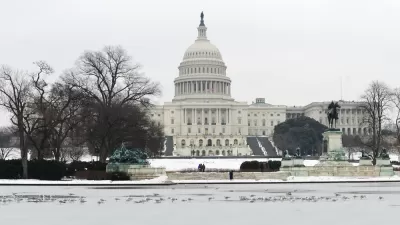A proposed Climate Planning Unit could help the federal government guide comprehensive climate policy and manage project costs.

A report from the Brookings Institution outlines suggestions for "how the White House can immediately kick-start climate solutions across our built environment through a new Climate Planning Unit (CPU)." The report suggests that the proposed office could "reduce the federal fiscal impacts of climate change by developing strategic intra-agency and cross-agency mitigation and adaptation projects and programs." By creating a federal office focused on climate change, the government can more effectively "identify opportunities (and outcomes) of effective climate action with direct and capturable federal financial benefits."
Federal investment in coordinated climate change policy has the potential to elevate climate concerns in development policies across the country, write Joseph W. Kane, Jenny Schuetz, Shalini Vajjhala, and Adie Tomer. "For instance, an 18F model can serve as a template for staffing, funding, and growing a new, dedicated federal unit focused on forward-looking research, metrics, and plans." The Blueprint developed by the Brookings Institution "supports the new high-level international and domestic climate leadership in the White House by establishing a stable basis for long-term, fiscally defensible, bipartisan federal climate action to complement other legislative and executive actions." The report also recommends a focus on "low-hanging fiscal fruit" that can help projects get off the ground faster and kickstart long-term efforts.
FULL STORY: How a federal Climate Planning Unit can manage built environment risks and costs

Planetizen Federal Action Tracker
A weekly monitor of how Trump’s orders and actions are impacting planners and planning in America.

Maui's Vacation Rental Debate Turns Ugly
Verbal attacks, misinformation campaigns and fistfights plague a high-stakes debate to convert thousands of vacation rentals into long-term housing.

San Francisco Suspends Traffic Calming Amidst Record Deaths
Citing “a challenging fiscal landscape,” the city will cease the program on the heels of 42 traffic deaths, including 24 pedestrians.

Defunct Pittsburgh Power Plant to Become Residential Tower
A decommissioned steam heat plant will be redeveloped into almost 100 affordable housing units.

Trump Prompts Restructuring of Transportation Research Board in “Unprecedented Overreach”
The TRB has eliminated more than half of its committees including those focused on climate, equity, and cities.

Amtrak Rolls Out New Orleans to Alabama “Mardi Gras” Train
The new service will operate morning and evening departures between Mobile and New Orleans.
Urban Design for Planners 1: Software Tools
This six-course series explores essential urban design concepts using open source software and equips planners with the tools they need to participate fully in the urban design process.
Planning for Universal Design
Learn the tools for implementing Universal Design in planning regulations.
Heyer Gruel & Associates PA
JM Goldson LLC
Custer County Colorado
City of Camden Redevelopment Agency
City of Astoria
Transportation Research & Education Center (TREC) at Portland State University
Jefferson Parish Government
Camden Redevelopment Agency
City of Claremont





























